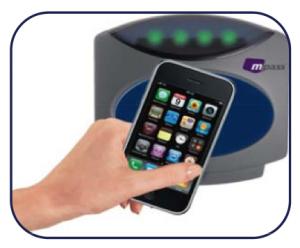German Telcos To Launch Trial of Their Own Payment Scheme in 2011

Mobile operators in yet another country are planning to test the waters for a possible future launch of their own mobile-payment scheme at the retail point of sale.
Major German telcos plan to hold a trial next year using contactless stickers that would enable subscribers to tap their phones to pay in stores with the telcos’ mpass payment service that is now available only for purchasing on the Internet. That is according to slides from a presentation an mpass representative was planning to give recently.
To be sure, there is no strong evidence yet that German operators are following their counterparts in the United States and some dominant carriers in Asia in trying to commercially launch their own payment scheme in physical stores. But the sticker trial and the possibility of the telcos later putting mpass on NFC phones is no doubt something German banks will be watching closely.
Mpass, which went live in early 2009, mainly enables mobile subscribers to shop on their PCs and pay using their handsets by entering their phone numbers and special mpass PIN codes on merchant Web sites on their computers, then confirming the purchases via SMS on their phones. The money is directly debited from their preregistered bank accounts.
But use of mpass is believed to be disappointing so far, despite discounts and other offers the telcos and e-commerce retail partners have offered, for example, on purchases of shoes, cinema tickets and football jerseys.
Mpass backers, however, believe that will change. Germany’s largest mobile operator, Deutsche Telekom, will soon adopt the service, NFC Times has learned. Only Germany’s second and third largest mobile telcos, Vodafone Germany and Telefónica O2 Germany, respectively, have promoted mpass and have preregistered their postpaid subscribers to use the service.
In addition, the telcos this month plan to enable subscribers to shop over the Internet on their smartphones with “one-click payment,” according to the presentation. Their phone numbers would automatically be sent to the mpass server. All they would have to do is enter their mpass PINs and confirm the transaction by SMS. Mpass backers point to projections that smartphone penetration in Germany will hit 22% by 2012 and use of the Internet on smartphones will soar.
But establishing mpass at the physical point of sale in Germany would be an even greater challenge than getting subscribers to use it on the Internet. There are few contactless terminals installed at retail outlets in Germany to date. Moreover, the telcos and their partners do not have the merchant acquiring relationships that German banks and the major debit card network, "electronic cash," possess.
While it might be feasible for consumers to do mpass transactions over the mobile network at the physical point of sale at certain types of merchants–those that do not require quick check-out–the transactions would be too slow for most merchants.
Martin Schurig , senior product manager at O2 Germany, when contacted this week by NFC Times, said he could not comment yet on the contactless-sticker trial or other plans by the telcos to expand mpass.
Slides for his planned presentation at last week’s Mobile Payment Services conference in Barcelona say only that the operators have scheduled the sticker trial for 2011 and would distribute the stickers themselves or through partner channels. The stickers appear to be passive, that is, they would not interact with the phone processor. Schurig could not make the conference, so did not actually deliver the presentation there. But NFC Times has heard from an independent source that the telcos are planning the trial.
Schurig has said in the past that the telcos could move mpass to NFC phones to introduce the payment service at the physical point of sale. And if they did so, they would not have to share retail transaction revenue with banks.
All that remains to be seen, and even if the German operators try to move forward with mpass at the point of sale, the telcos could still work with banks and the major card schemes to deliver contactless payment on NFC phones as part of separate m-payment services.












